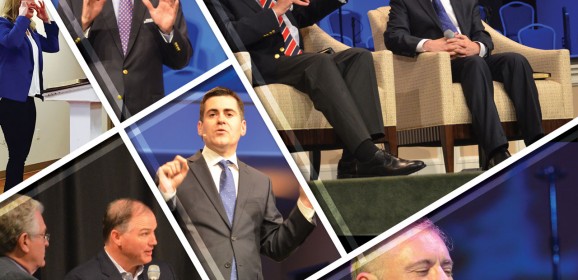
Note to readers: The above image is from the weekly publication, "The Baptist Messenger", produced by the Baptist General Convention of Oklahoma (BGCO). The link is www.baptistmessenger.com. All comments below and links were granted permission by the BGCO to be used in today's post. May what is written below inform and equip the reader to the glory of God.
Introduction:
A few weeks ago this blogger had the opportunity to attend a conference sponsored by the Baptist General Convention of Oklahoma (henceforth from here we will use it's abbreviation "BGCO") entitled: "The Gospel, Sexuality and the Church". My intention for attending this conference was two-fold:
1). To be equipped on how to better communicate to people what the Bible has to say about the Gospel and it's bearing on gender, sexuality, the church and culture.
2). To know how to express the love of Jesus in a better way to all people, regardless of sexual orientation.
The conference to say the least was very well done, organized, positively communicated and Biblical. As each sermon and panel discussion was presented, I felt it necessary to not only take notes but to make them available to readers of this blog with the hope of sharing this informative, engaging and Gospel-centered conference. Thus for the next few posts I will be sharing by way of summary the messages and panel discussions. The BGCO has posted some of the plenary sessionson their website, as well as links to their weekly publication: "The Baptist Messenger", which features after-conference reflections and articles by key leadership in the BGCO. Here are the links: http://www.bgco.org/bgco-conference and http://www.baptistmessenger.com/the-gospel-sexuality-the-church-2/. Today's post features a summary of a panel discussion that dealt with questions relating to our moral and spiritual responsibility in a culture that supports same-sex marriage. The participants in the discussion were Dr. R. Albert Mohler, President of The Southern Baptist Theological Seminary and Dr. Russell Moore, Chairman of the Ethics and Religious Liberty Commission of the Southern Baptist Convention.
| Panel discussion #1 Understanding our moral and spiritual responsibility in a culture that supports same-sex marriage. Question 1 how did we get to this point in our culture? Dr. Mohler noted the imminent collapse of the moral structure we thought was firm. The first sexual revolution was contraception. We felt we could separate sex and procreation. We ended up in separating sex from marriage in the 1965 Griswold decision that dealt with contraception, then called "the pill". Also too, the divorce revolution in the sixties and seventies contributed to how we arrived at this current state of affairs, causing marriage to be viewed as a temporary arrangement. Dr. Mohler then quoted a philosopher who noted that people live as if they don't fear God. If moralism is our message, we're done. Question 2: What are practical ways to uphold the biblical view of marriage without being bigots? Dr. Moore notes we can avoid being bigots but we can't avoid the gospel and being viewed as such. Pastors need to deal with issues as same-sex attractiveness, much like we would deal with pornography, temptation and other areas. Question 3: What attitudes must change? An adjustment in our view of truth must take place before a truth adjustment occurs in our heart. Question 4: What about the court ruling of same-sex marriage based on the 14th amendment. Right now 59% of Americans support same-sex marriage. Even if court rules against it, we are still in a same sex supporting culture. If we take the pro-life movement as a model - short term it was going to be difficult, however, long term though it thrived. How? By means of a multi-pronged strategy of political societal and spiritual reconciliation. Same sex marriage is not only immoral but impossible. If the courts on June 30th rule in favor of same-sex people as being a constitutionally protected class, it will have massive reprucussions for religious liberties. 37 States currently have legalized same-sex marriage. Question 5: What about convictional kindness? Dr. Moore noted that civility is too low of a bar. Capitulation is not kindness. 2 Timothy 2:23-25 tells us to speak and kindness the way Jesus said it. We express both content and the intention to convey the voice of Jesus. We must have confidence in the power of the Holy Spirit. We are not dealing with issues, but people. Question 6: What happens when a loved one expresses they are gay? We must recognize the language of the heart and deeds and how we treat people. Dr. Moore noted we must Crucifier pride. We must stop a searching for our own self image. There's not one family in the scripture that does not have a prodigal child. Research was done in North America, Africa and Asia with researchers telling the prodigal-son story as it appears in Luke 15:11-32. The researchers then had the people retell it back. The North Americans missed the detail of the family, whereas the Africans and South Americans did not. Question 6: How do we address this issue? We begin by talking about marriage and sexuality in the Bible and how it relates to the gospel. We must not have fear, but faith in addressing sin. Question 7: What blind spots do we have as evangelical Christians? We need to get to know gay and lesbian people so they can hear us and we can hear them. Closing thoughts? The Gospel will be voted down 100% of the time by unbelievers. Marriage persists because it is embedded in creation. (Genesis 1:26-28 and Genesis 2:23-25). We need to look to the Holy Spirit and the Scriptures. Dr. Mohler reminds us that the church has had to face these issues before, since the scriptures were revealed to it in a pagan, Graeco-Roman culture. |

No comments:
Post a Comment